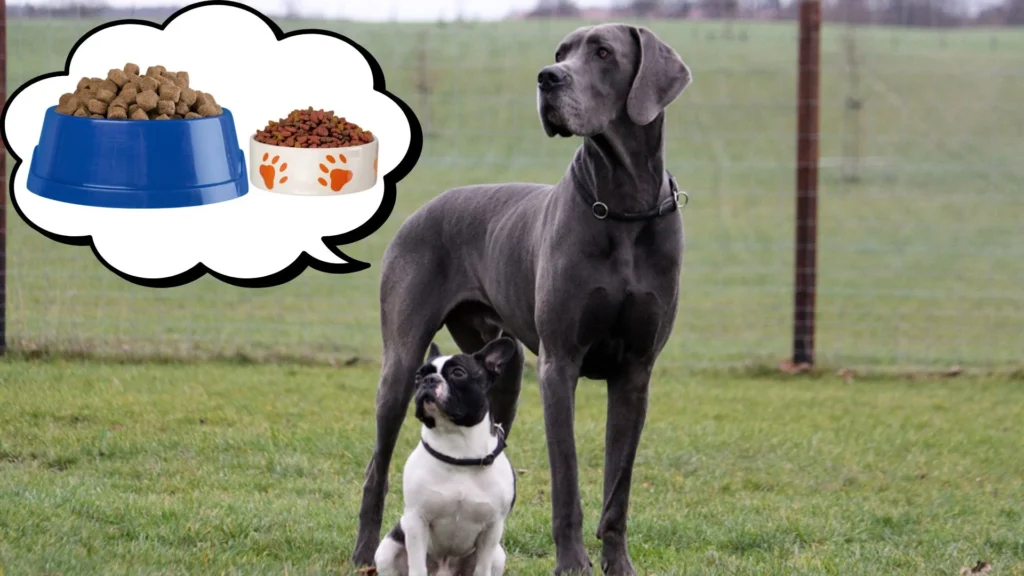One of the most important decisions you’ll make as a pet owner is choosing the right type of food. From dry kibble to wet food, from grain-free to high-protein options, the choices are endless. But one question that often arises is: can a small dog eat large breed dog food?
At first glance, it may seem like there’s no harm in giving a small dog food designed for large breeds, especially since both are marketed as nutritious and specially formulated for the health of dogs.
However, there are several key differences between small breed dog food and large breed dog food that could affect your dog’s overall well-being.
In this article, we’ll explore whether small dogs can eat large breed dog food, the potential benefits and risks, and what factors to consider before making the switch.
Can A Small Dog Eat Large Breed Dog Food?
Yes, a small dog can technically eat large breed dog food, but it’s not the best choice for their health. Large breed dog food is formulated to meet the needs of bigger dogs, which have different calorie, protein, and fat requirements.
Small dogs typically need higher protein and fat content to fuel their fast metabolism, and large breed food may not provide the right balance for them. It could also lead to digestive issues, weight gain, or nutritional imbalances if fed long-term.
While occasional consumption won’t harm them, it’s always best to feed small dogs food tailored to their size and nutritional needs.
Why Small Dog Eat Large Breed Dog Food Not Ideal?
Feeding a small dog large breed dog food isn’t ideal for several key reasons:
1. Nutrient Imbalance:
Large breed dog food is formulated for the needs of bigger dogs, with lower levels of protein and fat to suit their slower metabolism. Small dogs, on the other hand, require higher amounts of protein and fat to fuel their faster metabolism. Feeding them large breed food may result in them not getting enough of the nutrients they need for optimal health.
2. Excess Calories:
Large breed food typically has fewer calories per serving compared to small breed food, but it’s still designed to meet the energy requirements of larger dogs. Small dogs may end up consuming more calories than they need, leading to weight gain, which can cause obesity and related health problems.
3. Difficulty in Digestion:
The kibble in large breed dog food is usually larger and harder, which may be difficult for small dogs to chew and digest properly. This can lead to choking, discomfort, or digestive issues.
4. Bone and Joint Concerns:
Large breed food often contains added nutrients like glucosamine and chondroitin to support joint health in bigger dogs. While these are beneficial for large dogs, small dogs don’t typically require such high levels of these additives, and excess amounts could cause imbalances in their diet.

Is It Bad To Feed Small Dogs Large Breed Food?
Yes, it’s generally not a good idea to feed small dogs large breed food. While it won’t necessarily cause immediate harm, large breed food is formulated to meet the nutritional needs of bigger dogs, which differ significantly from those of smaller breeds.
Large breed dog food often has lower calorie content and different proportions of fat, protein, and calcium. Small dogs have faster metabolisms and require more calories, protein, and fat to stay healthy and active.
Feeding them large breed food could lead to weight gain, nutritional imbalances, and digestive issues over time.
It’s always best to choose food specifically tailored to your dog’s size and breed to ensure they’re getting the right nutrients.
When Could It Be Okay for a Small Dog to Eat Large Breed Dog Food?
In certain circumstances, it might be acceptable for a small dog to eat food formulated for large breeds. Below are a few potential scenarios:
1. Occasional Feeding:
If you’re in a pinch and out of your small breed dog food, feeding your dog large breed food for a day or two is unlikely to cause major harm. However, it should not be a long-term solution.
2. Special Health Concerns:
If your dog has a specific health condition that requires a diet lower in protein or fat, large breed dog food might be a suitable option. Some veterinarians may recommend this for weight control in dogs that are at risk of obesity, but this should always be done under the guidance of a vet.
3. Overweight Small Dogs:
If your small dog is overweight and needs to lose a few pounds, you might want to switch to a food with lower calories per serving, which is more common in large breed formulas. However, this is something that should be done carefully and with professional advice to ensure your dog’s nutritional needs are still being met.
What Should You Do if You Accidentally Feed Your Small Dog Large Breed Food?
If you’ve accidentally given your small dog large breed food, there’s no need to panic. A single meal or even a few meals shouldn’t cause lasting harm, but you should switch back to the correct food as soon as possible to ensure your dog’s health isn’t compromised.
If your dog seems to have digestive issues, such as vomiting, diarrhea, or a lack of appetite, it’s a good idea to consult your veterinarian.
They can offer advice on how to transition back to the appropriate food and check for any underlying health concerns.
What Happens If A Little Dog Eats Big Dog Food?
If a small dog eats large breed dog food, it may not get the proper balance of nutrients needed for its size. Large breed food typically has lower calories and less protein, which can leave small dogs undernourished, leading to low energy or poor growth.
Additionally, the higher calcium content in large breed food could cause joint issues in small dogs over time.
Regularly eating food designed for bigger dogs can also contribute to weight gain, digestive upset, and other health problems due to mismatched nutritional needs.
Conclusion
While it’s not dangerous for a small dog to occasionally eat large breed dog food, it’s not an ideal long-term solution.
The differences in calorie content, kibble size, and nutrient composition mean that small dogs have unique dietary needs that large breed food isn’t designed to meet.
For optimal health, it’s best to feed your small dog food that’s specifically formulated for their size and breed, ensuring they get the right balance of calories, protein, fats, and nutrients.
As always, when in doubt about your dog’s diet, it’s wise to consult your veterinarian. They can help guide you in choosing the best food for your pet’s specific needs, whether they’re small, large, or anywhere in between.

Hello dog lovers, I am John. Welcome to my website healthydogfoods.com. I am happy to gain experience from my love for my dog and my pet dog. Through my experience and acquaintance with dog veterinarians, I have made myself a proper guide for dogs. I will tell you about dog care, their nutritious food, their proper safety and dog upbringing for a better life. Even though dogs cannot talk like humans, I will solve all the problems by observing their behavior. I will discuss the proper care and related issues of your dog. Which will give you the right answer to all the problems of your beloved dog.